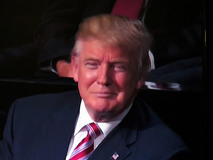
Trump's ideas amount to basically locking the door and creating thought police. These ideas are rooted in the tired, dangerous narrative of a clash of civilizations. He names a threat – radical Islamic terrorism – but never bothers to define it, perhaps leaving that to the commission with so-called Muslim “reformist voices” he said he'd create. (As a Muslim, I do not look forward to Trump explaining my religion to me.) Lamenting the rate of immigration, he persists in correlating immigrants and refugees with increase crime – even attacking children of immigrants. Wielding his broad brush, he proposed the latest version of his Muslim ban: blanket policy consisting of a reduction in the number of visas from countries to be designated as exporters of terror, or those with insufficient vetting. Then, he proposed a slightly refined version of Newt Gingrich's sharia test, calling it ideological screening, but clearly tying it only to “radical Islam.”
Confident that he had it all figured out, Trump proclaimed all countries who share his vision – ie, agreed with him – would be allies. “With us or against us.” Sound familiar?
Most recently, we tried blanket immigration policies in 2002 with the National Security Entry-Exit Registration System, or NSEERS. It required young men from 25 countries to register in a database. The only non-Muslim country was North Korea. Then, as now, Muslims bore the brunt of these knee-jerk, misguided policies. It's no “new approach” as Trump proudly proclaimed. It's stagnant water under the bridge. By 2011 when it was inactivated, NSEERS netted exactly zero terrorism-related convictions. Thousands of Muslims were swept up and deported, with devastating effects on their families.
But it goes back further than that. We have a long and ugly history of casting wide nets of exclusion in response to perceived threats. In the 1700's it was fear of treason. Then it was the Chinese, Eastern Europeans, anarchists, Jews, Germans, Japanese, gays, and Communists. Laws were passed, hearings were held, innocent people were swept up, and lives were devastated. Trump wants to do it again.
Trump calls his approach “extreme vetting” - an extremist response to extremism. Vetting really means the process by which a foreign national's eligibility to enter the United States is determined. But the law already provides immigration officers with a great deal of power to deny a visa or deny admission. For example, the Immigration Act of 1990 bars any foreigner whose admission could have potentially serious adverse foreign policy consequences. The terrorism-related grounds of inadmissibility are broadly defined, interpreted, and implemented. Procedural safeguards such as requiring all nationals from high-risk countries to appear before a consular officer in person are found throughout the Foreign Affairs Manual. Counterterrorism screening has improved by leaps and bounds, drawn on shared intelligence domestically and internationally. The doctrine of consular nonreviewability means that a consular officer's decision is final: no appeal. The tools are already there.
Ideological tests will encourage profiling, institutionalize prejudice, and divert resources away from assessing real threats. Trump's proposals are an act of security theater. New approaches create pressure to yield new results – and no one likes to come up empty time and time again. This is where innocent people get swept up.
Trump's proposals are an act of security theater.
Whenever we targeted a group for exclusion, we've found our fears unfounded. Each group we tried to exclude became us. We are the nation we are because we let immigrants in, not because we shut them out. There are always bad apples, but sniffing them out requires vigilance, experience, and focusing on the multitude of factors that create criminal intent. Our immigration policy must not exist in a vacuum, and history teaches us that inclusiveness has been our strength. We have to move past the knee-jerk reaction to close our borders every time xenophobia raises its ugly head. We are Americans, and we are better than this.



 RSS Feed
RSS Feed
